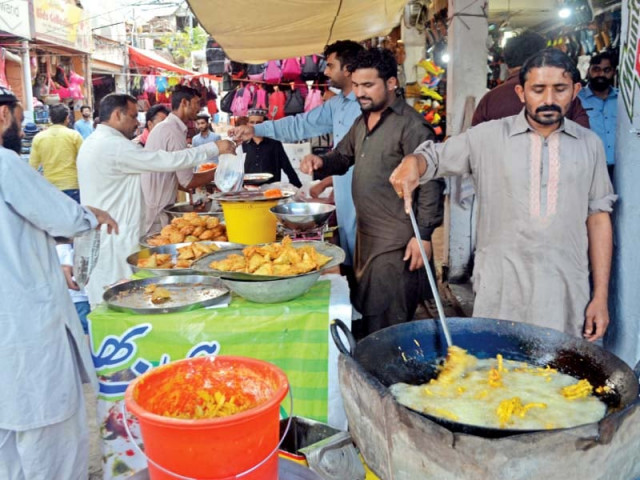WHO Advisory: Diabetics, expecting mothers advised to skip fast
People told to opt for balanced diets, focus on hydration while avoiding salty, oily food

Vendors making samosas and pakoras, which are considered must items for iftari. PHOTO: EXPRESS
In this regard, the global health body, the World Health Organisation, has issued an advisory about what to eat during Sehri and Iftar times during the holy month of Ramazan. It also suggests that people suffering from ailments such as diabetes, people who are prone to hypertension and expecting mothers, should skip the fast if they do not feel strong or healthy.
Healthy eating
With Ramazan falling at the peak of the hot summer months, the global health body has advised drinking plenty of fluids, as well as consuming foods which are rich in water or fluids such as fruits, vegetables, soups and stews.
Emphasising the importance of remaining hydrated during the high temperatures which have caused casualties in the port city of Karachi, the WHO advises drinking at least 10 glasses of water to restore fluids lost during the day and to start the next day of fasting well hydrated.
Since salt stimulates thirst, it said that it was a good idea to avoid consuming a lot of salty foods.
Moreover, highly caffeinated drinks such as coffee, teas and sodas should be avoided since caffeine may lead to dehydration.
People were urged to curtail consumption of fried, processed or fat-rich foods. Moreover, people were urged to consume high-fibre foods such as whole-grain, high fibre cereals, fruits and vegetables along with plenty of fluids to avoid constipation. Light physical activity such as walking was also advised.
Fasting with diabetes
People who are ill or have medical conditions have been urged not to fast.
Those suffering from Type-1 diabetes are generally advised not to fast as it puts them at a higher risk of hypoglycaemia and dehydration.
People who have their diabetes under control, either by their diet or by using medication, may be able to fast. However, they were urged to consult their doctors in case their medication needs to be altered to accommodate the long fasting hours.
Those who require insulin to control their diabetes are generally advised not to fast. If fasting, diabetes patients may be required to take smaller doses of insulin before the start of the fast apart from taking a different type of insulin (pre-mixed insulin is not recommended during fasting).
Patients were urged to include more slowly absorbed food such as rice and lentils, in the early morning meal, along with fruit and vegetables. Check your blood glucose levels more often than you normally would do.
When opening the fast, such people were advised to consume plenty of sugar-free and decaffeinated fluids to avoid dehydration. Moreover, they were advised to take small quantities of food while avoiding sweet or fatty foods.
Fasting with migraines
People with uncontrollable migraines should not fast, but managing migraines are possible with the right medicine and certain lifestyle changes.
Fasting with hypertension
People with well-controlled high blood pressure can fast.
Doctors can advise medication outside fasting times or change the prescription.
Someone with low blood pressure who is otherwise healthy may fast, but they must ensure that they drink enough fluids and have enough salt.
Fasting during pregnancy
If a pregnant or breastfeeding mother feels strong and healthy enough to fast, she may do so. However, if she does not feel healthy enough to fast, Islamic law gives her clear permission not to, and to make up the missed fasts later, the advisory read.
Published in The Express Tribune, May 23rd, 2018.


















COMMENTS
Comments are moderated and generally will be posted if they are on-topic and not abusive.
For more information, please see our Comments FAQ